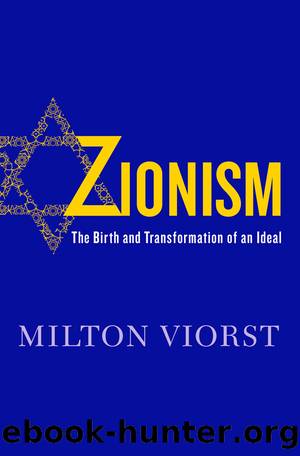Zionism by Milton Viorst

Author:Milton Viorst
Language: eng
Format: epub
ISBN: 9781466890329
Publisher: St. Martin's Publishing Group
5
Rav Abraham Isaac Kook
1865â1935
Rabbi Zvi Yehuda Kook
1891â1982
REVIVALISTS
In 1904, Rav Abraham Isaac Kook, convinced by the pogrom in Kishinev that a secure life for the Jews was no longer possible in his native Russia, left behind a solid rabbinic career to settle with his wife and children in Palestine. Kook had no allegiance to Zionism, which he regarded as impermissibly secular. He also considered Zionism too similar to the aggressive nationalism that was infecting much of Europe. But he had by then turned away from the rabbinic doctrine that the Jews could return to their land only under the Messiahâs leadership. In Palestine, Kook shaped an ideology that over the years transformed Zionist thinking, locking Judaism and nationalism in a tight political embrace.
Rav Kook was already a creative force in Jewish theology when he migrated to Palestine. âRavâ was an honorific title signifying his intellectual eminence. He had three daughters, for whom he had no plans, but he also had a son, named Zvi Yehuda, whom he never doubted would follow him into the rabbinate. Yet father and son were quite different. The Rav was a commanding theologian whose mind covered a full range of Jewish spirituality; Jewish nationalism was only one of his interests. His son, less gifted intellectually, grew up a more practical man. Under his fatherâs tutelage, he came to think of nationalism and religion as synonymous. Zvi Yehuda made his mark on Jewish life by engaging in religious activism, fulfilling his fatherâs vision of infusing Zionism with Jewish belief.
The Zionist doctrine devised by Rav Kook, the father, maintained that the secularism which the pioneers brought with them from Europe was a passing fancy, a temporary digression from the Jewsâ age-old fidelity to their religion. The pioneers may not have perceived Godâs presence in their settlement of the land, he said. But far from abandoning Judaism, they were conducting themselves according to Godâs will.
âIf a Jewish secular nationalism were really imaginable,â Rav Kook once wrote, âthen we would be in danger of falling so low as to be beyond Redemption. But secular nationalists do not know how closely they are linked to the spirit of God. A Jewish nationalist, no matter how secular his intentions, is steeped in the divine spirit. A single Jew can sever his bonds to God but the House of Israel cannot. All of its dearest possessionsâits land, language, history, customsâare vessels of the Lordâs spirit.â
âOnly in the Land of Israel,â he declared another time, âcan the people of Israel engage in Jewish independent creativity, whether in the realm of ideas or daily life and action.⦠Revelations of the Holy can be pure in the Land of Israel; in Exile, they are mixed with dross and impurity.â1
Rav Kook found the roots of his defiance of Orthodoxy deep in the body of Judaism. In drawing widely in his writing from diverse sources, he filled his work not only with conventional theology but with an elusive mysticism. As he saw it, the dogma that barred Jews
Download
This site does not store any files on its server. We only index and link to content provided by other sites. Please contact the content providers to delete copyright contents if any and email us, we'll remove relevant links or contents immediately.
| Anarchism | Communism & Socialism |
| Conservatism & Liberalism | Democracy |
| Fascism | Libertarianism |
| Nationalism | Radicalism |
| Utopian |
The Secret History by Donna Tartt(16662)
The Social Justice Warrior Handbook by Lisa De Pasquale(11494)
Thirteen Reasons Why by Jay Asher(7803)
This Is How You Lose Her by Junot Diaz(5800)
Weapons of Math Destruction by Cathy O'Neil(5047)
Zero to One by Peter Thiel(4835)
The Myth of the Strong Leader by Archie Brown(4796)
Promise Me, Dad by Joe Biden(4459)
Beartown by Fredrik Backman(4435)
Stone's Rules by Roger Stone(4423)
How Democracies Die by Steven Levitsky & Daniel Ziblatt(4414)
The Fire Next Time by James Baldwin(4351)
100 Deadly Skills by Clint Emerson(4086)
A Higher Loyalty: Truth, Lies, and Leadership by James Comey(4041)
Rise and Kill First by Ronen Bergman(4021)
The David Icke Guide to the Global Conspiracy (and how to end it) by David Icke(3892)
The Farm by Tom Rob Smith(3878)
Secrecy World by Jake Bernstein(3789)
The Doomsday Machine by Daniel Ellsberg(3738)
